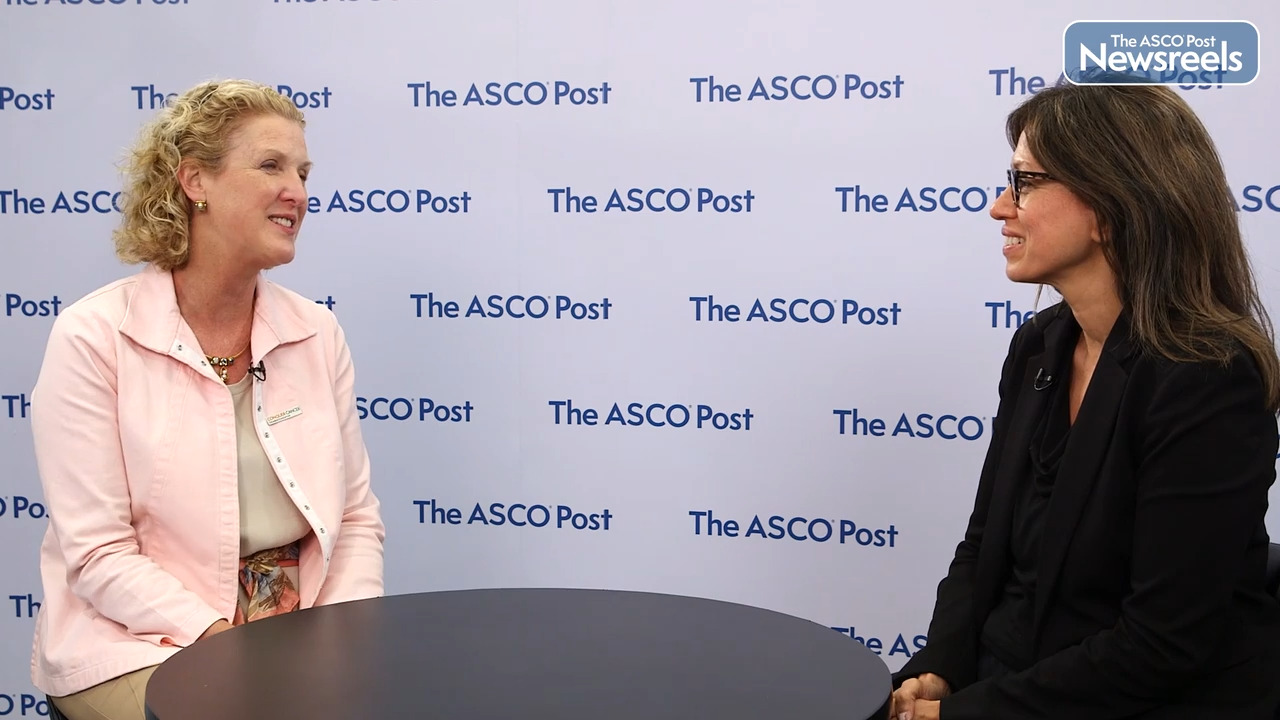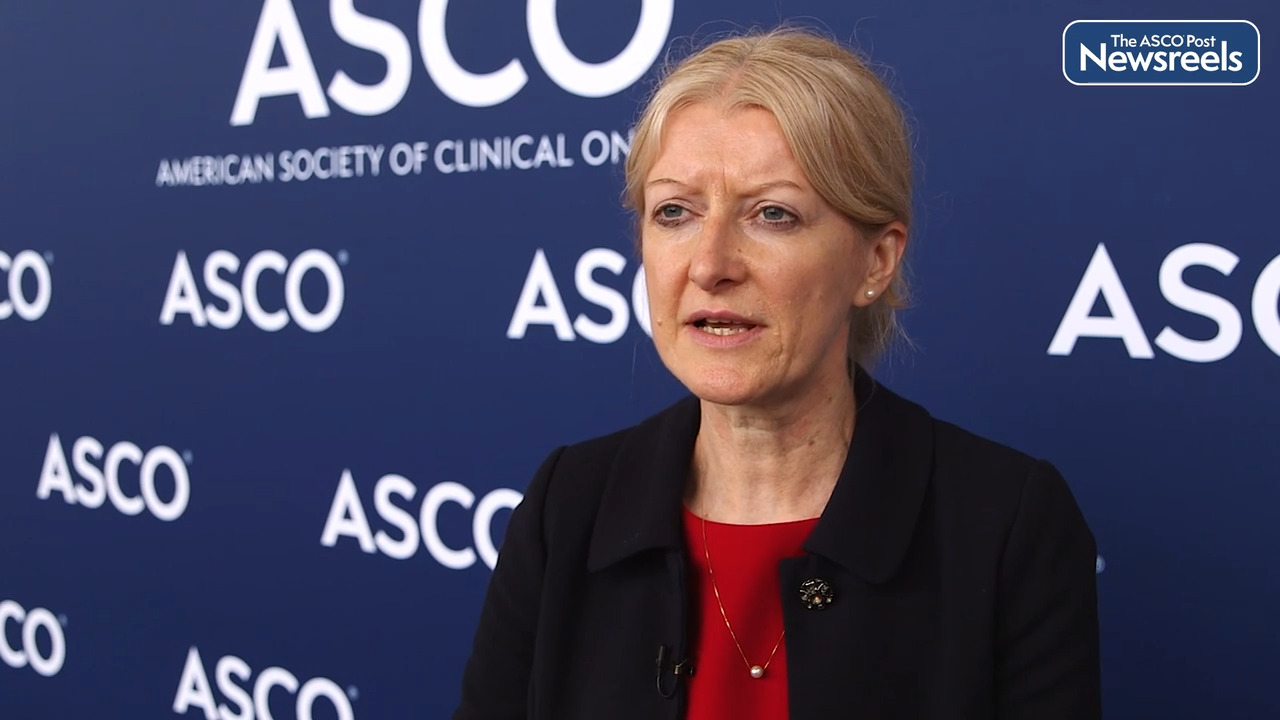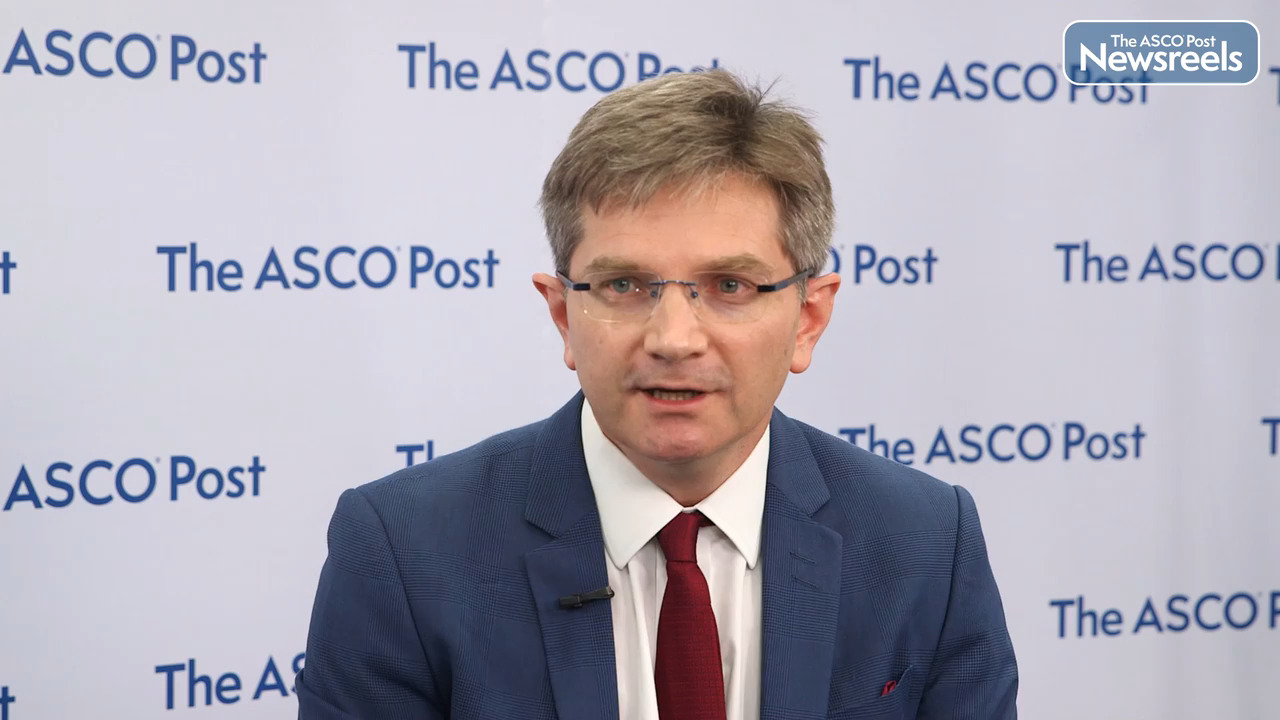Pamela L. Kunz, MD, on Pancreatic Neuroendocrine Tumors: A Final Analysis of Temozolomide or Temozolomide Plus Capecitabine
2022 ASCO Annual Meeting
Pamela L. Kunz, MD, of the Yale University School of Medicine, discusses new findings from the ECOG-ACRIN E2211 trial, which showed the longest progression-free survival and highest response rates with temozolomide plus capecitabine reported to date for patients with pancreatic neuroendocrine tumors. The presence of a deficiency of MGMT, the drug-resistance gene, was associated with greater odds of an objective response (Abstract 4004).
Transcript
Disclaimer: This video transcript has not been proofread or edited and may contain errors.
This study is a randomized phase two study through ECOG-ACRIN called E2211. And it's a study that examines capecitabine and temozolomide versus temozolomide alone in patients with advanced pancreatic neuroendocrine tumors. And this study was conceived at a time when we had few available agents for pancreatic NETs and there's a subset of patients with pancreatic neuroendocrine tumors who need an objective response, tumor shrinkage. And a number of our available agents don't yield responses. They yield prolonged stability. And so this was an opportunity to really test cytotoxic chemotherapy in this patient population. Until this time we had streptozocin, which is an IV alkylating chemotherapy for this patient population. It was FDA approved in the 1980s. And since then we haven't had many other cytotoxic chemotherapies available for this group of patients.
Temozolomide is an oral alkylating agent, and it has advantages over streptozocin in the sense that it is orally bioavailable, it crosses the blood brain barrier, and it has a better side effect profile. Temozolomide was selected as the comparator arm, compared to cape-tem, or capecitabine temozolomide, as we wanted both arms to examine temozolomide prospectively. This was a design that randomized 144 patients one to one, so there were 72 patients on each arm. The maximum treatment duration was 13 cycles, or about a year. And the primary endpoint was progression-free survival by local review and secondary endpoints included response rate, overall survival, and a safety assessment. And we had correlative analyses on MGMT, methylguanine methyltransferase, which is a DNA-repair enzyme that were reported as part of this study. And so, in terms of the endpoints, the interim analysis, which was reported at ASCO 2018, showed that there was a median progression-free survival benefit of capecitabine and temozolomide of 22 versus 14 months for temozolomide alone. And this updated analysis shows that there is no benefit or difference in overall survival between the arms, however, no statistical difference, I should say. However, there is a clinically relevant, significant difference of about five months between the two arms. The other really key part of this presentation is the MGMT correlative analysis. That indicates MGMT deficiency as defined by immunohistochemistry low or promoter methylation positive. Both of those at MGMT deficient are associated with increased response. So this study, because both arms contain temozolomide, is not a study that will help us to determine if MGMT is predictive of response, but we do see that it's associated with increased responses. The other interesting thing that we learned is that MGMT by IHC is more common, whereas MGMT by promoter methylation is not as common. And, of the patients that received both tests, it appears as if there are likely other reasons for MGMT down regulation outside of methylation. So, in summary, this is one of the first prospective randomized studies to demonstrate a prolonged median progression-free survival of 22 months. And there was no statistically significant difference in overall survival, but there was a clinically meaningful difference of about five months. And MGMT deficiency is associated with an increased response. The takeaways clinically are that capecitabine temozolomide really should be considered a standard of care and included in guidelines for patients with advanced pancreatic NETs. Routine use of MGMT testing is not recommended. However, for patients who really need objective responses, we can consider using MGMT testing. There are some follow up studies. So there are two that are in progress. One is a clinical trial. They're both actually through the national clinical trial network. One is a clinical trial looking at the adjuvant use of capecitabine temozolomide following surgery for patients with high risk pancreatic NETs. And it's looking at four months of capecitabine temozolomide versus placebo. And another is a clinical trial examining lutetium dotatate radioligand therapy versus capecitabine temozolomide in advanced pancreatic NETs.
Related Videos
The ASCO Post Staff
Ursula A. Matulonis, MD, of Dana-Farber Cancer Institute, and Ignace Vergote, MD, PhD, of Belgium’s University Hospitals Leuven, discuss interim safety and efficacy results from a third dose-expansion cohort evaluating first-line tisotumab vedotin-tftv plus pembrolizumab in patients with recurrent or metastatic cervical cancer. Data on the combination showed durable antitumor activity with a manageable safety profile (Abstract 5507).
The ASCO Post Staff
Lisa A. Carey, MD, of the University of North Carolina Lineberger Comprehensive Cancer Center, and Shanu Modi, MD, of Memorial Sloan Kettering Cancer Center, discuss the phase III findings from the DESTINY-Breast04 trial, which compared fam-trastuzumab deruxtecan-nxki (T-DXd) vs treatment of physician’s choice (TPC) in patients with HER2-low unresectable and/or metastatic breast cancer. T-DXd is the first HER2-targeted therapy to demonstrate clinically meaningful improvement in progression-free and overall survival compared with TPC in this patient population, regardless of hormone receptor or immunohistochemistry status or prior use of CDK4/6 inhibitors (Abstract LBA3).
The ASCO Post Staff
Stephen M. Ansell, PhD, MD, of Mayo Clinic, discusses updated data from the ECHELON-1 trial, which showed that, when administered to patients with stage III or IV classical Hodgkin lymphoma, the combination of brentuximab vedotin, doxorubicin, vinblastine, and dacarbazine (A+AVD) vs doxorubicin, bleomycin, vinblastine, and dacarbazine resulted in a 41% reduction in the risk of death. These outcomes, says Dr. Ansell, confirm A+AVD as a preferred option for previously untreated disease (Abstract 7503).
The ASCO Post Staff
Mairéad G. McNamara, PhD, MBBCh, of The Christie NHS Foundation Trust, discusses phase II findings of the NET-02 trial, which explored an unmet need in the second-line treatment of patients with progressive, poorly differentiated extrapulmonary neuroendocrine carcinoma. In the trial, the combination of liposomal irinotecan, fluorouracil, and folinic acid, but not docetaxel, met the primary endpoint of 6-month progression-free survival rate (Abstract 4005).
The ASCO Post Staff
Benoit You, MD, PhD, of Lyon University hospital (HCL, France) and GINECO group (France), discusses findings from the GOG-0218 trial of patients with ovarian cancer, which appears to confirm earlier data on the link between poor tumor chemosensitivity and benefit from concurrent plus maintenance bevacizumab. In Dr. You’s validation study, patients who derived the most progression-free and overall survival benefit from bevacizumab were those with high-risk disease (stage IV or incompletely resected stage III) associated with an unfavorable KELIM score (CA-125 kinetic elimination rate constant, calculable online) (Abstract 5553).





